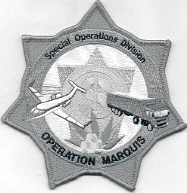
Collecting insignia from the Federal Bureau of Investigation since 1999.
This site is not officially sanctioned by the Department of Justice, The Federal Bureau of Investigation, The Louisville Metro Police Department, or any of their entities.
© Copyright 1999-2006. All Rights Reserved.
On June 20, 2001, culminating an 18-month nationwide investigation, agents of the DEA, the FBI, and the U.S. Customs Service, and state and local law enforcement officers arrested 76 individuals. In addition, 185 individuals had previously been arrested as part of the operation. The suspects were involved with a Mexico-based drug trafficking organization responsible for putting tens of millions of dollars worth of cocaine and marijuana on the streets of at least a dozen U.S. cities. The investigation has continued and as of August 2006, 48 additional arrests were made, bringing the total Operation Marquis arrests to 309 individuals. So far, the operation has resulted in the seizure of 8,645 kilograms of cocaine, 23,096 pounds of marijuana, 50 pounds of methamphetamine, and $13 million in U.S. currency.
The investigation, known as Operation Marquis, targeted a drug trafficking organization based in Nuevo Laredo, Mexico. The Marquis organization consisted of members of the former Amado Carrillo-Fuentes organization, along with other well-known traffickers. Transportation and distribution "cells" of the Marquis organization had been established in cities across the United States, including: Laredo, San Antonio, Austin, Dallas, Houston, Tulsa, Chicago, Wichita, Little Rock, New York City, Newark, Charlotte, Detroit, Atlanta, Cleveland, Memphis, and Nashville.
Over the last several years, the Marquis organization was alleged to have moved large quantities of cocaine and marijuana through the Nuevo Laredo transportation corridor into south Texas. In most cases, the drugs were temporarily warehoused in the Laredo area before being transshipped to established distribution cells operating throughout the United States. The organization's preferred method of transportation was tractor-trailers, with the narcotics concealed under cover loads of produce. However, the organization also utilized automobiles with concealed compartments for the transportation of smaller quantities of narcotics. Drug proceeds were generally repatriated to Mexico using the same trucks and cars.
Arrests were conducted simultaneously during the early morning hours of June 20 in 16 cities. Provisional arrest warrants naming 14 Marquis organization members in Mexico were submitted to Mexican authorities. In addition, the operation was briefed to the Director of the Organized Crime Unit of the Mexican Attorney General's Office, and investigative information on the identities of targets and telephone numbers in Mexico was shared. Mexican law enforcement agents arrested 15 individuals and conducted numerous search warrants. Mexican agents and prosecutors will seek to develop and/or supplement cases against targets for prosecution in Mexico or the United States. The sharing of this type of sensitive investigative information during an on-going investigation in the United States set a new standard in the level of trust and cooperation in the bilateral law enforcement relationship between the two countries.
"The success of Operation Marquis is an excellent example of what can be done when we work together with our law enforcement counterparts in Mexico," said Attorney General John Ashcroft. "The Attorney General of Mexico and I have agreed to focus our law enforcement efforts on major drug traffickers and send a clear message to those criminals on both sides of our border that there will be serious consequences for preying on the citizens of our countries."
According to Former DEA Administrator Donnie Marshall, "The Marquis organization appears to be fairly typical of today's organizations operating from Mexico–smaller groups that rely on each other to capitalize on drug trafficking opportunities. Nevertheless, these organizations remain just as violent and dangerous as ever." In this regard, the Marquis organization demonstrated a propensity for violence. For example, three men, Jorge Ruvalcaba, Cesar Blake, and Idelfonso "Pancho" Chavarria, were shot to death in San Antonio, allegedly on the orders of Marquis associate Hugo Villareal-Solis. Villareal-Solis, Jose "Joey" Abel Rodriguez, and the alleged gunman, Roberto Lopez, have been indicted in the Western District of Texas on drug and murder charges.
FBI Assistant Director Ruben Garcia, Jr., said, “These law enforcement activities will have a measurable impact on drug trafficking across our Southwest Border. The work completed in this case emphasizes the importance of interagency cooperation in targeting and investigating drug trafficking organizations."
Acting U.S. Customs Commissioner Charles Winwood added, "This investigation demonstrates what can be achieved when law enforcement efforts are coordinated and resources are pooled. Operation Marquis shut down a sprawling criminal network that plagued communities throughout the country."
The investigation was initiated in September 1999 and was coordinated by the Special Operations Division, a joint Department of Justice, DEA, FBI, U.S. Customs and IRS program, staffed by attorneys from the Justice Department's Criminal Division and agents and analysts from the participating investigative agencies.
Operation Marquis was extremely successful in disrupting sources of supply, and in identifying Mexico-based command and control members and domestic cell heads. Its success was largely the result of the coordinated use of electronic surveillance and selfless cooperation among federal, state, and local law enforcement officials.
Source: Drug Enforcement Administration
